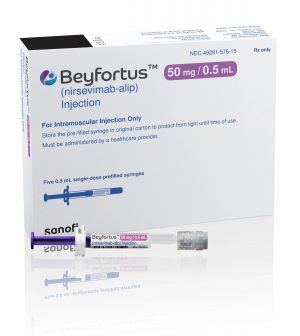- Could Your Grocery Store Meat Be Causing Recurring UTIs?
- Are You Making This Expensive Thermostat Error This Winter?
- Recognizing the Signs of Hypothyroidism
- 10 Strategies to Overcome Insomnia
- Could Artificial Sweeteners Be Aging the Brain Faster?
- Techniques for Soothing Your Nervous System
- Does the Water in Your House Smell Funny? Here’s Why
- Can a Daily Dose of Apple Cider Vinegar Actually Aid Weight Loss?
- 6 Health Beverages That Can Actually Spike Your Blood Sugar
- Treatment Options for Social Anxiety Disorder
Real World Data Shows RSV Shot Cut Infant Hospitalizations by 90%

Real-world data show that a shot that protects babies against RSV is 90% effective in keeping them out of the hospital.
Those numbers outstrip what had been expected of Beyfortus (nirsevimab), which in clinical trials had prevented the need for medical care for RSV infection by 79% and hospitalization by 81%, researchers from the U.S. Centers for Disease Control and Prevention report.
Beyfortus is recommended for all infants younger than 8 months of age during their first respiratory syncytial virus (RSV) season, the CDC says.
RSV is the leading cause of hospitalization in young children, responsible for landing 50,000 to 80,000 kids younger than 5 in U.S. hospitals each year, according to the CDC.
Beyfortus is a monoclonal antibody that specifically boosts a baby’s immune system to fight RSV infections. It was approved by the FDA last summer, so this was the first cold and flu season where the medication had a chance to prove its mettle.
There are also RSV vaccines available, but they are only recommended for seniors and expecting mothers.
For the new study, the CDC scientists tracked 699 infants over the past five months, using early data from the agency’s New Vaccine Surveillance Network.
Results show that Beyfortus was 90% effective at preventing RSV-related hospitalizations in infants.
Infants with high-risk medical conditions were more likely to receive the shot than healthier babies, 46% versus 6%, the CDC said.
“RSV prevention products remain our single most important tool to protect infants from RSV,” the agency noted in a news release.
The CDC did say this was a shorter surveillance period than usual, and that Beyfortus’ effectiveness may be lower over a full RSV season extending from October through March. That’s because protection from monoclonal antibodies typically wanes over time.
Nirsevimab is specifically for infants whose mothers did not receive an RSV vaccine while expecting, the CDC says. A mom’s inoculation against RSV transfers protective antibodies to the baby.
The study was published March 7 in the CDC’s Morbidity and Mortality Weekly Report.
More information
The U.S. Centers for Disease Control and Prevention has more about RSV protection for infants and toddlers.
SOURCE: U.S. Centers for Disease Control and Prevention, news release, March 7, 2024
Source: HealthDay
Copyright © 2026 HealthDay. All rights reserved.










